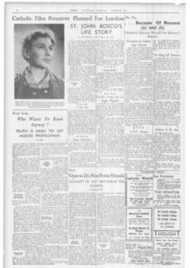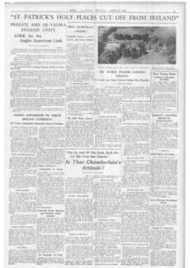Page 9, 25th March 1938
Page 9

Report an error
Noticed an error on this page?If you've noticed an error in this article please click here to report it.
Tags
Share
Related articles
Polish Security Guaranteed By Britain
Will U.s.s.r. Renounce Past Aggressions?
Polish Minister
Poland Keeps Cool A Trend To French Friendship
Poland Truths To Be
POLAND WOULD LIKE BALTIC UNION AGAINST RUSSIA AND GERMANY
By a Correspondent Returned from Poland War clouds over North-East Europe were indefinitely dispelled by Lithuania's timely capitulation to Polish demands.
For eighteen years-since the Polish occupation of Wilno, which the Lithuanians claim as their rightful and historic capital -the two nations have been at loggerheads. For eighteen years a state " neither of peace nor war " had been maintained by Lithuania's refusal to acknowledge her loss, despite all the rulings of international courts.
For eighteen years the frontier has been "dead "-Europe's "forbidden frontier "; a pole barrier reinforced with ditches and barbed wire, armed sentries, railway lines and telegraph wires cut, roads overgrown. For eighteen years no direct relations, commercial, diplomatic or postal.
Poland's Chief Aim
Today the impossible stalemate is broken. Legations will be opened in War saw and Kaunas, the Lithuanian capital, by the end of the month; and negotiations undertaken between the two Governments to settle outstanding problems and restore normal intercourse.
It is ,understood that one of the chief aims Ptiland has in mind is the creation of a neutral block of Baltic States between Germany and Russia. Affecting some 42 million people, it is felt this would be a valuable contribution to European peace, as well as considerably enhancing Poland's prestige. A Baltic union under Polish leadership has indeed long been Poland's ambition.
A Few Yards on the Wrong Side The occasion, but not the root cause, of the crisis was a frontier incident on March 11, when a Polish frontier guard was alleged toe% lulve -spoon " ambushed and killed " a few yards within Lithuanian territory..
The actual circumstances arc, and will remain, obscure. Certainly the Pole was admitted to have been on the wrong side, and however many the yards, one does not wander unwittingly through barbed wire entanglements. The Lithuanian did what he was there to do.
But from the outset it was perfectly clear that Warsaw was interested in the precise circumstances a good deal less than in the incident as an excuse for bringing pressure on the Kaunas Government with a view to " finally settling " the long-standing dispute and on Polish terms. The supposition was moreover confirmed by the Poles' categorical rejection of a Lithuanian proposal that the incident be subjected to enquiry by a mixed commission.
In Kaunas the decision of the Lithuanian Parliament to give in, however unanimous, left much bitterness. Anti-Polish feeling has been intensified and several Ministers are expected to resign. The formation of a National Front has been strongly urged to strengthen resistance to further Polish demands.
Why Did Poland Do It ?
Fantastic tales have been put about of a Polish-German-Hungarian " deal " involving the absorption of Lithuania and the partition of Czechoslovakia. The Soviet press has openly accused Poland of provoking war in Eastern Europe at Hitler's command.
But surely the only sane interpretation is as a precautionary measure of security. The additional threat to the notoriously indefensible Polish Corridor by the Nazification and fortification of Danzig, was bound to direct Poland's attention once again to the possibility of securing alternative access to the sea through Lithuania.
In All Fairness to Poland . . .
The German and Polish coups de force differed widely in principle.
In all fairness to Poland it should be recalled that she did not have recourse to coercion till long years of intermittent negotiation continually torpedoed by Lithuania's refusal to accept any but favourable arbitration-which was never forthcoming -had proved legal procedure quite incapable of resolving an impossible situation.
Assuming the rape of Wilno in 1920 was indefensible, Lithuania herself disarmed the forces of legal intervention by the rape of Memel in 1923. And for eighteen years she solidly refused to recognise the status quo despite Poland's possession of Wilno being confirmed by the Conference of Ambassadors, the Council of the League, and, one should add, the Holy See.
The continual provocation was impolitic and admittedly excessive, particularly as the Lithuanian population of Wilno is in a distinct minority, and the maintenance of a " dead " frontier a patent absurdity with highly detrimental effects on the well-being of others beside the two countries directly concerned.
The deplorable economic condition of East Prussia, for instance, can be largely, though not exclusively, ascribed to the stoppage of traffic on the river Niemen effected by the protracted Polish-Lithuanian dispute.
If the present detente prove the prelude to a permanent reconciliation, the dramatic events of the past week must be hailed as a valuable contribution towards the stabilising of European affairs, however reprehensible the methods.
ECONOMIC ISSUE
All overland goods traffic from the Balkans to West Europe or Italy must pass through Poland, Czechoslovakia, or Jugoslavia.
But, since the Anschluss only Jugoslavia has a non-German western frontier, and hence goods must pass westwards through Jugoslavia if the Austro-German block refuses to allow such transit of goods. The railway connections over this route are quite inadequate.
In short, the great and historic overland route through Vienna and Switzerland to Italy or France is no longer a free trade route.
The Anschluss must therefore be regarded as an important step towards the German objective of economic hegemony in Central and East Europe.
blog comments powered by Disqus

















